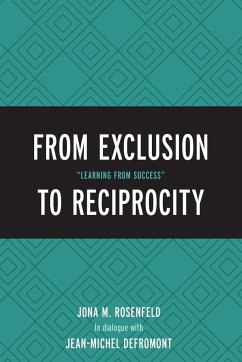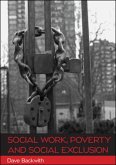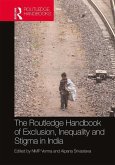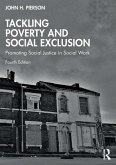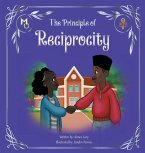- Broschiertes Buch
- Merkliste
- Auf die Merkliste
- Bewerten Bewerten
- Teilen
- Produkt teilen
- Produkterinnerung
- Produkterinnerung
Prof. Jona Rosenfeld is one of Israel's pioneering social workers. This book is a vivid testimony to his long life dedicated to social work, sociology, psychotherapy and social action. He clarifies the domain and expertise of social work in order to enable social workers to be more effective.
Andere Kunden interessierten sich auch für
![Social Work, Poverty and Social Exclusion Social Work, Poverty and Social Exclusion]() Dave BackwithSocial Work, Poverty and Social Exclusion45,99 €
Dave BackwithSocial Work, Poverty and Social Exclusion45,99 €![The Routledge Handbook of Exclusion, Inequality and Stigma in India The Routledge Handbook of Exclusion, Inequality and Stigma in India]() The Routledge Handbook of Exclusion, Inequality and Stigma in India49,99 €
The Routledge Handbook of Exclusion, Inequality and Stigma in India49,99 €![How Europeans Understand Solidarity, Reciprocity and Fairness in the EU How Europeans Understand Solidarity, Reciprocity and Fairness in the EU]() How Europeans Understand Solidarity, Reciprocity and Fairness in the EU154,99 €
How Europeans Understand Solidarity, Reciprocity and Fairness in the EU154,99 €![Freedom, Culture, and the Right to Exclude Freedom, Culture, and the Right to Exclude]() Uwe SteinhoffFreedom, Culture, and the Right to Exclude154,99 €
Uwe SteinhoffFreedom, Culture, and the Right to Exclude154,99 €![The Gift in the Economy and Society The Gift in the Economy and Society]() The Gift in the Economy and Society154,99 €
The Gift in the Economy and Society154,99 €![Tackling Poverty and Social Exclusion Tackling Poverty and Social Exclusion]() John H. PiersonTackling Poverty and Social Exclusion47,99 €
John H. PiersonTackling Poverty and Social Exclusion47,99 €![The Principle of Reciprocity The Principle of Reciprocity]() Aimee LaryThe Principle of Reciprocity23,99 €
Aimee LaryThe Principle of Reciprocity23,99 €-
-
-
Prof. Jona Rosenfeld is one of Israel's pioneering social workers. This book is a vivid testimony to his long life dedicated to social work, sociology, psychotherapy and social action. He clarifies the domain and expertise of social work in order to enable social workers to be more effective.
Produktdetails
- Produktdetails
- Verlag: University Press of America
- Seitenzahl: 164
- Erscheinungstermin: 7. November 2016
- Englisch
- Abmessung: 229mm x 152mm x 9mm
- Gewicht: 242g
- ISBN-13: 9780761867982
- ISBN-10: 0761867988
- Artikelnr.: 45153576
- Herstellerkennzeichnung
- Libri GmbH
- Europaallee 1
- 36244 Bad Hersfeld
- gpsr@libri.de
- Verlag: University Press of America
- Seitenzahl: 164
- Erscheinungstermin: 7. November 2016
- Englisch
- Abmessung: 229mm x 152mm x 9mm
- Gewicht: 242g
- ISBN-13: 9780761867982
- ISBN-10: 0761867988
- Artikelnr.: 45153576
- Herstellerkennzeichnung
- Libri GmbH
- Europaallee 1
- 36244 Bad Hersfeld
- gpsr@libri.de
Jona M. Rosenfeld, professor emeritus and former Dean of Social Work and Social Welfare, studied at the London School of Economics, The Hebrew University of Jerusalem, and the School of Social Service Administration at the University of Chicago. He is the founder of the Unit for Learning from Success and Ongoing Learning in the Human Services at the Myers-JDC-Brookdale Institute, Jerusalem Israel. He is the first recipient of Israel Prize for Social Work (1998) French author of bestselling novels translated into six languages, Jean-Michel Defromont is a permanent activist of the international movement ATD Fourth World since 1974. His work has been seeking to give a voice to people struggling with extreme poverty, starving for recognition of their human dignity. His books include life stories in Europe, Africa, Indian Ocean, the Caribbeans and the Middle East.
Preface
Introduction
Part I: My Origins
I.1. The Beginning of Life: Six Weeks in a Hospital
I.2. A Father to Follow
I.3. The Ways of my Mother
Part II: Formative Years 1933-1955: From an Immigrant in Palestine to a
Citizen of Israel
II.1. My Beginnings in Palestine
II.2. Moving on: Training for Social Work in Post-War London
II.3. My First Assignment: When the Army is a Place for more than just
Waging War
II.4. Well-Baby Centers in Jerusalem: Being there at the Beginnings
Part III: Six Years in Chicago: "Unleashing Hidden Potential" for Learning
the Craft of Social Work
Introduction: Learning the Craft of Social Work from the Past and for the
Future
III.1. On Becoming the Social Worker I became at the School of Social
Service Administration in Chicago
III.2. To Be a Social Worker One Needs to Overcome the "Strangeness between
Helper and Client"
III.3. To Serve the Excluded in our Midst Requires the "Invention of
Interventions"
III.4. When an Outsider who Belongs Initiates Moves Beyond Exclusion
III.5. Serving the Individual and the Collective: An Unresolvable Dilemma
that Leads to Learning
III.6. On Psychoanalysis and Social Work as the Key for Introducing
Personal and Professional Reciprocity in the Present and thus for the
Future
Part IV: On Trails towards "Learning from Success": Seven Examples
Introduction: Seven Pursuits which in Retrospect was an Unexpected
Precursor of "Learning from Success"
IV.1. Training of Air Force Pilots in Israel (1954-55): How to Put an End
to Excessive Flunking of Cadets
IV.2. Serving Families of Sailors in the Israeli Merchant Marine, 1964
IV.3. The Unpredicted Mobility of Boys from a Low-Income Community: Which
Patterns of Parenting Made their Resilience Possible?
IV.4. When a Crisis is an Opportunity: What Enabled New York Families whose
Homes Burned down to Achieve a Better Life
IV.5. On Forced Evacuations: From Sinai (1982) and then the Gaza Strip
(2005)
IV.6. "To Be a 'Good Enough' Parent": How Nurses in Well-Baby Centers in
Israel Implement a Learning Program Addressing Early Childhood Neglect if
not Abuse
IV.7. "Out from Under": A First Study on "Learning from Success of
Organizations Serving Socially Deprived Families in Israel"
Part V: Moving beyond Exclusion Means Initiating and Introducing
Reciprocity
V.1. On the Move from Exclusion to Reciprocity and how to Facilitate it
V.2. On the Learning of Practices that Facilitate the Move from Exclusion
to Reciprocity
PART VI: The Evolving of Reciprocity: The Long Journey of Chaim who
Survived the Holocaust at the Age of Three
Part VII: My Acquaintance with ATD the Fourth World Movement: Where the
Introduction of Reciprocity is a Means for Moving beyond Exclusion
Introduction: On Initiating Reciprocity and Ongoing Learning
VII.1. It's People Living in Poverty, Not Poverty
VII.2. How I Got to Know the ATD Fourth World Movement: "The Man who was
Shushed"
VII.3. "Emergence from Extreme Poverty": So You Want to Know about the
Successes of the Families
VII.4. "Artisans of Democracy": What Might "Learning Companions" do to
Enable Organizations to Contribute to Moves beyond Exclusion
VII.5. From Learning that "Only the Best is 'Good Enough'" to Introducing
the 17th of October-The World Day for the Eradication of Poverty-into the
Knesset (Parliament) of Israel
VII.6. Learning for Action in an International Seminar Sponsored by the ATD
Fourth World Movement
VII.7. Reflective Ongoing Learning from Success: A Chance for a Movement
and Others with a Mission of Change
PART VIII: Epilogue: "Genocide" and "Poverty": Two Collective Man-Made
Evils of our Epochs: A Challenge for the Future
Acknowledgements
Appendices
I. ATD ("All Together in Dignity")-The Fourth World Movement
II. The Unit for Learning from Success and Ongoing Learning in Human
Services, Myers-JDC-Brookdale Institute
III. The Three Methods of Learning from Success
IV. The Components of the First and the Second Methods of Learning from
Past Success
References
Introduction
Part I: My Origins
I.1. The Beginning of Life: Six Weeks in a Hospital
I.2. A Father to Follow
I.3. The Ways of my Mother
Part II: Formative Years 1933-1955: From an Immigrant in Palestine to a
Citizen of Israel
II.1. My Beginnings in Palestine
II.2. Moving on: Training for Social Work in Post-War London
II.3. My First Assignment: When the Army is a Place for more than just
Waging War
II.4. Well-Baby Centers in Jerusalem: Being there at the Beginnings
Part III: Six Years in Chicago: "Unleashing Hidden Potential" for Learning
the Craft of Social Work
Introduction: Learning the Craft of Social Work from the Past and for the
Future
III.1. On Becoming the Social Worker I became at the School of Social
Service Administration in Chicago
III.2. To Be a Social Worker One Needs to Overcome the "Strangeness between
Helper and Client"
III.3. To Serve the Excluded in our Midst Requires the "Invention of
Interventions"
III.4. When an Outsider who Belongs Initiates Moves Beyond Exclusion
III.5. Serving the Individual and the Collective: An Unresolvable Dilemma
that Leads to Learning
III.6. On Psychoanalysis and Social Work as the Key for Introducing
Personal and Professional Reciprocity in the Present and thus for the
Future
Part IV: On Trails towards "Learning from Success": Seven Examples
Introduction: Seven Pursuits which in Retrospect was an Unexpected
Precursor of "Learning from Success"
IV.1. Training of Air Force Pilots in Israel (1954-55): How to Put an End
to Excessive Flunking of Cadets
IV.2. Serving Families of Sailors in the Israeli Merchant Marine, 1964
IV.3. The Unpredicted Mobility of Boys from a Low-Income Community: Which
Patterns of Parenting Made their Resilience Possible?
IV.4. When a Crisis is an Opportunity: What Enabled New York Families whose
Homes Burned down to Achieve a Better Life
IV.5. On Forced Evacuations: From Sinai (1982) and then the Gaza Strip
(2005)
IV.6. "To Be a 'Good Enough' Parent": How Nurses in Well-Baby Centers in
Israel Implement a Learning Program Addressing Early Childhood Neglect if
not Abuse
IV.7. "Out from Under": A First Study on "Learning from Success of
Organizations Serving Socially Deprived Families in Israel"
Part V: Moving beyond Exclusion Means Initiating and Introducing
Reciprocity
V.1. On the Move from Exclusion to Reciprocity and how to Facilitate it
V.2. On the Learning of Practices that Facilitate the Move from Exclusion
to Reciprocity
PART VI: The Evolving of Reciprocity: The Long Journey of Chaim who
Survived the Holocaust at the Age of Three
Part VII: My Acquaintance with ATD the Fourth World Movement: Where the
Introduction of Reciprocity is a Means for Moving beyond Exclusion
Introduction: On Initiating Reciprocity and Ongoing Learning
VII.1. It's People Living in Poverty, Not Poverty
VII.2. How I Got to Know the ATD Fourth World Movement: "The Man who was
Shushed"
VII.3. "Emergence from Extreme Poverty": So You Want to Know about the
Successes of the Families
VII.4. "Artisans of Democracy": What Might "Learning Companions" do to
Enable Organizations to Contribute to Moves beyond Exclusion
VII.5. From Learning that "Only the Best is 'Good Enough'" to Introducing
the 17th of October-The World Day for the Eradication of Poverty-into the
Knesset (Parliament) of Israel
VII.6. Learning for Action in an International Seminar Sponsored by the ATD
Fourth World Movement
VII.7. Reflective Ongoing Learning from Success: A Chance for a Movement
and Others with a Mission of Change
PART VIII: Epilogue: "Genocide" and "Poverty": Two Collective Man-Made
Evils of our Epochs: A Challenge for the Future
Acknowledgements
Appendices
I. ATD ("All Together in Dignity")-The Fourth World Movement
II. The Unit for Learning from Success and Ongoing Learning in Human
Services, Myers-JDC-Brookdale Institute
III. The Three Methods of Learning from Success
IV. The Components of the First and the Second Methods of Learning from
Past Success
References
Preface
Introduction
Part I: My Origins
I.1. The Beginning of Life: Six Weeks in a Hospital
I.2. A Father to Follow
I.3. The Ways of my Mother
Part II: Formative Years 1933-1955: From an Immigrant in Palestine to a
Citizen of Israel
II.1. My Beginnings in Palestine
II.2. Moving on: Training for Social Work in Post-War London
II.3. My First Assignment: When the Army is a Place for more than just
Waging War
II.4. Well-Baby Centers in Jerusalem: Being there at the Beginnings
Part III: Six Years in Chicago: "Unleashing Hidden Potential" for Learning
the Craft of Social Work
Introduction: Learning the Craft of Social Work from the Past and for the
Future
III.1. On Becoming the Social Worker I became at the School of Social
Service Administration in Chicago
III.2. To Be a Social Worker One Needs to Overcome the "Strangeness between
Helper and Client"
III.3. To Serve the Excluded in our Midst Requires the "Invention of
Interventions"
III.4. When an Outsider who Belongs Initiates Moves Beyond Exclusion
III.5. Serving the Individual and the Collective: An Unresolvable Dilemma
that Leads to Learning
III.6. On Psychoanalysis and Social Work as the Key for Introducing
Personal and Professional Reciprocity in the Present and thus for the
Future
Part IV: On Trails towards "Learning from Success": Seven Examples
Introduction: Seven Pursuits which in Retrospect was an Unexpected
Precursor of "Learning from Success"
IV.1. Training of Air Force Pilots in Israel (1954-55): How to Put an End
to Excessive Flunking of Cadets
IV.2. Serving Families of Sailors in the Israeli Merchant Marine, 1964
IV.3. The Unpredicted Mobility of Boys from a Low-Income Community: Which
Patterns of Parenting Made their Resilience Possible?
IV.4. When a Crisis is an Opportunity: What Enabled New York Families whose
Homes Burned down to Achieve a Better Life
IV.5. On Forced Evacuations: From Sinai (1982) and then the Gaza Strip
(2005)
IV.6. "To Be a 'Good Enough' Parent": How Nurses in Well-Baby Centers in
Israel Implement a Learning Program Addressing Early Childhood Neglect if
not Abuse
IV.7. "Out from Under": A First Study on "Learning from Success of
Organizations Serving Socially Deprived Families in Israel"
Part V: Moving beyond Exclusion Means Initiating and Introducing
Reciprocity
V.1. On the Move from Exclusion to Reciprocity and how to Facilitate it
V.2. On the Learning of Practices that Facilitate the Move from Exclusion
to Reciprocity
PART VI: The Evolving of Reciprocity: The Long Journey of Chaim who
Survived the Holocaust at the Age of Three
Part VII: My Acquaintance with ATD the Fourth World Movement: Where the
Introduction of Reciprocity is a Means for Moving beyond Exclusion
Introduction: On Initiating Reciprocity and Ongoing Learning
VII.1. It's People Living in Poverty, Not Poverty
VII.2. How I Got to Know the ATD Fourth World Movement: "The Man who was
Shushed"
VII.3. "Emergence from Extreme Poverty": So You Want to Know about the
Successes of the Families
VII.4. "Artisans of Democracy": What Might "Learning Companions" do to
Enable Organizations to Contribute to Moves beyond Exclusion
VII.5. From Learning that "Only the Best is 'Good Enough'" to Introducing
the 17th of October-The World Day for the Eradication of Poverty-into the
Knesset (Parliament) of Israel
VII.6. Learning for Action in an International Seminar Sponsored by the ATD
Fourth World Movement
VII.7. Reflective Ongoing Learning from Success: A Chance for a Movement
and Others with a Mission of Change
PART VIII: Epilogue: "Genocide" and "Poverty": Two Collective Man-Made
Evils of our Epochs: A Challenge for the Future
Acknowledgements
Appendices
I. ATD ("All Together in Dignity")-The Fourth World Movement
II. The Unit for Learning from Success and Ongoing Learning in Human
Services, Myers-JDC-Brookdale Institute
III. The Three Methods of Learning from Success
IV. The Components of the First and the Second Methods of Learning from
Past Success
References
Introduction
Part I: My Origins
I.1. The Beginning of Life: Six Weeks in a Hospital
I.2. A Father to Follow
I.3. The Ways of my Mother
Part II: Formative Years 1933-1955: From an Immigrant in Palestine to a
Citizen of Israel
II.1. My Beginnings in Palestine
II.2. Moving on: Training for Social Work in Post-War London
II.3. My First Assignment: When the Army is a Place for more than just
Waging War
II.4. Well-Baby Centers in Jerusalem: Being there at the Beginnings
Part III: Six Years in Chicago: "Unleashing Hidden Potential" for Learning
the Craft of Social Work
Introduction: Learning the Craft of Social Work from the Past and for the
Future
III.1. On Becoming the Social Worker I became at the School of Social
Service Administration in Chicago
III.2. To Be a Social Worker One Needs to Overcome the "Strangeness between
Helper and Client"
III.3. To Serve the Excluded in our Midst Requires the "Invention of
Interventions"
III.4. When an Outsider who Belongs Initiates Moves Beyond Exclusion
III.5. Serving the Individual and the Collective: An Unresolvable Dilemma
that Leads to Learning
III.6. On Psychoanalysis and Social Work as the Key for Introducing
Personal and Professional Reciprocity in the Present and thus for the
Future
Part IV: On Trails towards "Learning from Success": Seven Examples
Introduction: Seven Pursuits which in Retrospect was an Unexpected
Precursor of "Learning from Success"
IV.1. Training of Air Force Pilots in Israel (1954-55): How to Put an End
to Excessive Flunking of Cadets
IV.2. Serving Families of Sailors in the Israeli Merchant Marine, 1964
IV.3. The Unpredicted Mobility of Boys from a Low-Income Community: Which
Patterns of Parenting Made their Resilience Possible?
IV.4. When a Crisis is an Opportunity: What Enabled New York Families whose
Homes Burned down to Achieve a Better Life
IV.5. On Forced Evacuations: From Sinai (1982) and then the Gaza Strip
(2005)
IV.6. "To Be a 'Good Enough' Parent": How Nurses in Well-Baby Centers in
Israel Implement a Learning Program Addressing Early Childhood Neglect if
not Abuse
IV.7. "Out from Under": A First Study on "Learning from Success of
Organizations Serving Socially Deprived Families in Israel"
Part V: Moving beyond Exclusion Means Initiating and Introducing
Reciprocity
V.1. On the Move from Exclusion to Reciprocity and how to Facilitate it
V.2. On the Learning of Practices that Facilitate the Move from Exclusion
to Reciprocity
PART VI: The Evolving of Reciprocity: The Long Journey of Chaim who
Survived the Holocaust at the Age of Three
Part VII: My Acquaintance with ATD the Fourth World Movement: Where the
Introduction of Reciprocity is a Means for Moving beyond Exclusion
Introduction: On Initiating Reciprocity and Ongoing Learning
VII.1. It's People Living in Poverty, Not Poverty
VII.2. How I Got to Know the ATD Fourth World Movement: "The Man who was
Shushed"
VII.3. "Emergence from Extreme Poverty": So You Want to Know about the
Successes of the Families
VII.4. "Artisans of Democracy": What Might "Learning Companions" do to
Enable Organizations to Contribute to Moves beyond Exclusion
VII.5. From Learning that "Only the Best is 'Good Enough'" to Introducing
the 17th of October-The World Day for the Eradication of Poverty-into the
Knesset (Parliament) of Israel
VII.6. Learning for Action in an International Seminar Sponsored by the ATD
Fourth World Movement
VII.7. Reflective Ongoing Learning from Success: A Chance for a Movement
and Others with a Mission of Change
PART VIII: Epilogue: "Genocide" and "Poverty": Two Collective Man-Made
Evils of our Epochs: A Challenge for the Future
Acknowledgements
Appendices
I. ATD ("All Together in Dignity")-The Fourth World Movement
II. The Unit for Learning from Success and Ongoing Learning in Human
Services, Myers-JDC-Brookdale Institute
III. The Three Methods of Learning from Success
IV. The Components of the First and the Second Methods of Learning from
Past Success
References

